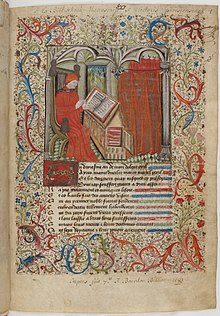Alain Chartier
Alain Chartier (* around 1385 in Bayeux ; † between 1430 and 1446 in Avignon ) was a French diplomat and important author.
Life and work
Chartier (often referred to as "Alain" in literary histories and encyclopedias) came from a middle-class family in the Norman episcopal city of Bayeux . Like his eldest brother Guillaume, who later became bishop of Paris, and his elder brother Thomas, who became royal notary, he studied in Paris. By 1415 at the latest, he was also related to the court as secretary to the Dauphin , later King Charles VII. He served him practically his entire life and often traveled as a competent negotiator in diplomatic missions for him to European princes. As a thank you he got several canon foundations (which could be accumulated) from him. He died in Avignon on a diplomatic trip . Its existence was overshadowed by the worst phase of the Hundred Years War between the crowns of England and France, as well as the internal French civil war between Bourguignons and Armagnacs .
Chartier began as a lyric poet and throughout his life wrote numerous ballads, rondeaus, virelais, etc. The main tone of most of his poems is melancholy. His poetry was considered exemplary by contemporaries.
His first long work was the poetry story Le Livre des quatre dames in 1416 , which he wrote under the shock of the defeat of a far superior French army of knights against the disciplined English archers at the Battle of Azincourt (1415). Here a first-person narrator reports on four women who ask him to decide who is the most unlucky of them: the one whose friend died in battle, the one whose friend has been missing since then, the one whose friend was imprisoned there , or finally those whose friend saved himself by cowardly flight.
In 1418 Chartier fled with the Dauphin and his entourage before the Bourguignons from Paris to Bourges. There he wrote in 1422 in response to the confused circumstances that followed the death of the deranged Charles VI. had erupted, the Quadrilogue invectif , a four- way conversation between the allegorical figures le Clergé (= the Catholic clergy), la Chevalerie (= the nobility), le Peuple (= the people) and Dame France. "Ms. France" rebukes the three others, i. H. the French as a whole, because of their disagreement and urges them to support their rightful new king, Charles VII. This namely had an opposing king in the form of his nephew, a son of his sister Catherine and Henry VI. of England , who ruled north and west of France from Paris and with the help of English troops.
Chartier went down in literary history primarily as the author of the narrative La belle dame sans merci (= the merciless beautiful lady, 1424), which he apparently wrote to amuse the court of Charles VII, who at that time remained idly in Bourges and hardly at all did something to enforce his royal rights. The 100 eight eight- syllable stanzas ("huitains") of Belle dame sans merci contain a small framework story about a first-person narrator who is presented identically to the author, in which a long, allegedly overheard dialogue between a lover and his lady is embedded . With these two figures, Chartier evidently succeeded in creating an exemplary design of the type of the brittle, refusing woman, the “merciless beautiful”, and above all the languishing lover, i.e. H. of the rejected, but unable to break free and consumed in his misfortune, the lover who naively invokes the ideals and rules of courtly love, while the latter is ironically distant. Chartier's work was enormously successful and was quoted, plagiarized, pastiched and parodied endlessly by other authors in the decades that followed; Even around 1540 it was assumed to be known by Margaret of Navarre in her stories.
Chartier reacted once more to the confused political situation in France with the Lai de Paix (= peace poem), in which in 1426 he called on the French princes for peace and unity under his lord Charles VII.
In 1429 he made himself with a Lettre sur Jeanne to the advocate of Jeanne d'Arc , the maiden of Orléans, who had roused the idle Charles VII and him in the same year with victories over the troops of Henry VI. the symbolically important coronation in Reims Cathedral .
literature
- Daisy Delogu et al. (Ed.): A Companion to Alain Chartier (c. 1385-1430). Father of French Eloquence. Brill, Leiden 2015, ISBN 978-90-04-27218-7
Web links
- Literature by and about Alain Chartier in the catalog of the German National Library
- Works by Alain Chartier in the complete catalog of incandescent prints
- Article in "Names, titles and dates of French literature"
Remarks
- ↑ Alain Chartier . In: Gero von Wilpert (Ed.): Lexikon der Weltliteratur , 3rd edition 1988, p. 285.
| personal data | |
|---|---|
| SURNAME | Chartier, Alain |
| BRIEF DESCRIPTION | French poet |
| DATE OF BIRTH | around 1385 |
| PLACE OF BIRTH | Bayeux |
| DATE OF DEATH | between 1430 and 1446 |
| Place of death | Avignon |
